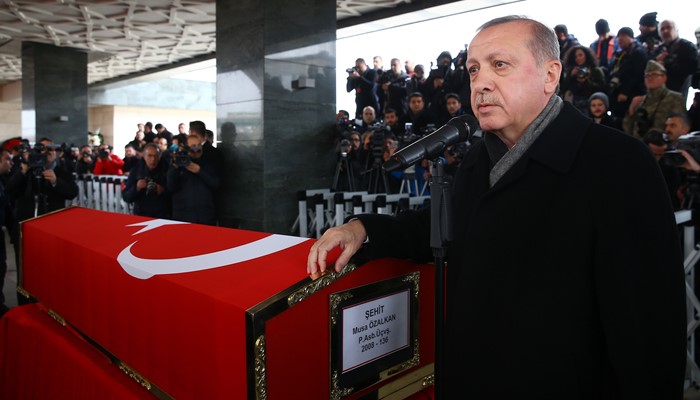by Abdullah Bozkurt
The flip-flopping and dizzying speed of Turkey’s foreign policy that has been conducted according to the whims and emotions of one man, Turkish President Recep Tayyip Erdoğan, who has not shied away from abusing policy tools to cling to power and justify his repressive regime, has unfortunately contributed to the isolation of Turkey in its neighborhood and in the world.

Take the unresolved Kurdish problem in particular and the ever-widening deficit in Turkey’s democracy in general as an example explaining why many in the world find it hard to believe Ankara’s claims. In justifying Turkish military actions that have been taking place in two of its neighbors on its southern and southeastern borders, namely Iraq and Syria, the Erdoğan government cites the presence of militants from the outlawed Kurdistan Workers’ Party (PKK) and its affiliates in those countries. Yet, it was the Erdoğan government that wanted the PKK to move its militants across the border when it was pursuing the settlement process launched to end a decades-long armed fight and resolve the Kurdish problem.
In fact, when the jailed leader of the PKK, which is listed as a terrorist organization by the US, the EU and Turkey, called on “armed members to move out of Turkey’s borders” on March 21, 2013, the Erdoğan government hailed the announcement as a major breakthrough. His message, written as part of negotiations with the Turkish government, was televised live and allowed to reach to millions of Kurds during Newroz celebrations. The Turkish Parliament approved a bill to frame the settlement talks and endorse the government initiatives on July 10, 2014.
Now, the same government that tried to dump its own problem on neighboring countries claims that the very existence of militants is enough reason to justify military incursions and the setting up of bases by the Turkish armed forces. By doing so, the Erdoğan government has in fact undermined its own position internationally and damaged its credibility under the pretext of the fight against terrorism. This was clearly shown when Turkey moved troops, tanks and armored vehicles on Dec. 3, 2015 to beef up the military camp set up by Turkey in the Ba‘shiqah region, near the city of Mosul, in northern Iraq. The Turkish move prompted protests by Baghdad. The Iraqi government noted that it had neither agreed to such a move nor was it provided advance notice of troop deployment, which amounted to a breach of the nation’s sovereignty. Turkey defended itself by saying that it had the right to engage in the cross-border military operation because of the fight against terrorism and cited the presence of PKK militants in Iraq.
In response to this claim, Iraq’s Foreign Minister Ibrahim Al-Jaafari wrote to the UN Security Council on Oct. 17, 2016 stating that “Turkey has claimed that Iraq has harbored members of the Kurdistan Workers’ Party (PKK). Those claims are not true. On 21 March 2013, Turkey signed a so-called peace agreement with Abdullah Ocalan, leader of the PKK. One of the paragraphs of that agreement provides that the armed members of that group would move into Iraqi territory. When that agreement was signed, Iraq condemned that paragraph and considered it to be an infringement of its sovereignty and a threat to security and peace in Iraq and the region. It also sent a letter of protest on 16 May 2013 to the League of Arab States and the United Nations. Yet, now, Turkey justifies its presence in northern Iraq by stating that it is pursuing the very same PKK that, in 2013, it demanded should withdraw to Iraq under the terms of the above-mentioned peace agreement.”
It is clear that the shortsighted political goals have served the immediate interests of Erdoğan rather than contributing to the overall national security of Turkey. Erdoğan does not realize that consistency, reliability and credibility are the most valuable currency in conducting foreign policy. The Justice and Development Party’s (AKP) patchwork diplomacy, often coupled with blaming others, scapegoating and dumping Turkey’s problems on others, can only take Erdoğan a certain distance. Then the hard reality kicks in, with Turkey’s allies and partners scrambling to contain Erdoğan and limit the damage he can inflict on Turkey and others.
The Afrin military incursion, although agreed by the US and Russia on the condition that it must be limited in scope and duration, showed how Erdoğan can deliberately escalate his war-mongering euphoria, feed an irredentist appetite and ratchet up the anti-Western frenzy in Turkey. There is no doubt that the intensity of relentless bashing and bullying of the US and other allies is unprecedented, and this is promoted and led by Erdoğan himself as well as other Cabinet members, including top diplomat Mevlüt Çavuşoğlu, who called the US all kinds of nasty names and declared Erdoğan the leader of all Muslims in the world. Most of this chest-thumping is aimed at domestic political consumption, especially ahead of the 2019 elections, but it certainly undermines Turkey’s decades-long alliance with key partners in NATO.
Turkey does not need any enemies when this Islamist thug is doing everything in his power to damage the credibility of Turkey in the world with flip-flopping policies that were designed to serve his petty interests, such as propping Islamist groups in other countries and mobilizing Turkish and Muslim diaspora groups to advance his political goals.



